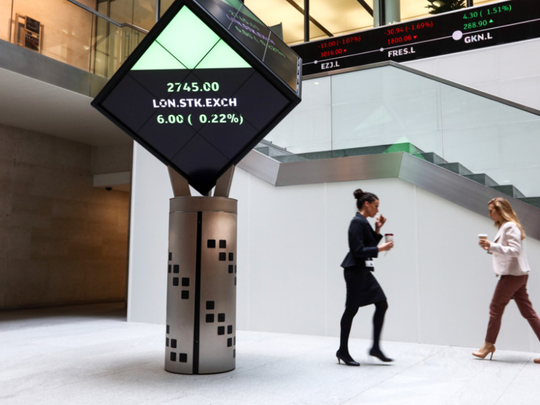
Paris: Arqiva Group Ltd, which owns UK wireless towers, and fresh-food producer Bakkavor Group Plc scrapped their planned initial public offerings in London, deterred by falling prices for some recent IPOs.
Arqiva had planned a £1.5 billion (Dh7.2 billion, $2 billion) offering that would have been the biggest in the UK this year, while Bakkavor sought to raise about £100 million.
The decisions show that even as European stocks head for their biggest annual return in four years, investors are becoming more selective about shares of newly listed companies. While rising markets have fuelled a booming IPO pipeline, several companies that went public this year are trading below their offering prices, including French clothing retailer SMCP SAS and Swiss energy-metering company Landis+Gyr Group AG.
“Investors are keeping their powder dry for when there will be more choice of companies,” said Neil Glover, business development director for IPOs at the professional-services firm EY in London. “These IPOs will be better IPOs in that they will be more fitting with investment choices.”
Adding to the uncertainties in London are the political storm over the UK’s exit from the European Union as well as turmoil in the foreign-exchange market after the Bank of England raised interest rates this week. BOE Governor Mark Carney said the UK is in “an unusual period of under-performance” given the strength of other industrialised economies, even as the FTSE 100 index trades near record highs.
A “massive pipeline” of UK stock offerings is building for next year, Glover said, and companies will need to complete those sales by September or October, “ahead of any Brexit cliff edge.” The UK is scheduled to leave the EU in March 2019, though the two sides are struggling to agree on terms for the divorce.
“Pursuing a listing in this period of IPO market uncertainty is not in the interests of the company and its stakeholders,” Arqiva said Friday in a statement. It will revisit the listing “once IPO market conditions improve.”
While Bakkavor had received sufficient demand from institutional investors, it decided not to go ahead with the offering “given the current volatility in the IPO market,” the company said in a statement. “The board has taken the decision that proceeding with the transaction would not be in the best interests of the company, or its shareholders.”
IPO boom
Still, other companies are pressing ahead. En+ Group Plc, the power and commodities company controlled by Russian billionaire Oleg Deripaska, sold $1.5 billion of global depositary receipts in Moscow and London at $14 each, the low end of the range it had sought, the company said Friday. And Yildiz Holding AS, the owner of Godiva chocolates, plans to sell shares in its Turkish discount grocery unit in London in an IPO that may value the company at $3 billion or more, according to people with knowledge of the plans.
Companies have sold $48.5 billion of stock in IPOs on Western European exchanges this year, up 54 per cent from the comparable period a year earlier, according to data compiled by Bloomberg. Of the 240 companies, about a third are trading below their IPO price, the data show.
Planned sale
For Arqiva, the decision extends a drawn-out process during which it has contemplated a sale or IPO. The company last month scrapped a plan to sell itself, and instead said it was seeking to sell shares in what would have been the biggest UK IPO of the year.
Arqiva operates about 8,000 mobile-phone towers used by phone carriers including Vodafone Group Plc, and provides digital and satellite services to pay-TV operators. Its shareholders include Canada Pension Plan Investment Board, Macquarie Group Ltd’s European Infrastructure Fund and IFM Global Infrastructure Fund. Goldman Sachs Group Inc, HSBC Holdings Plc and JPMorgan Chase & Co were among banks managing the IPO.
Bakkavor supplies UK grocers with salads, desserts, pizza and other prepared meals and has benefited from growth in fresh foods as consumers seek healthier diets. Customers include Tesco Plc and Marks & Spencer Group Plc.
The company is controlled by Icelandic siblings Agust and Lydur Gudmondsson, who had planned to trim their 59 per cent holding in the sale. HSBC, Morgan Stanley, Barclays and Citi had been arranging Bakkavor’s offering.












